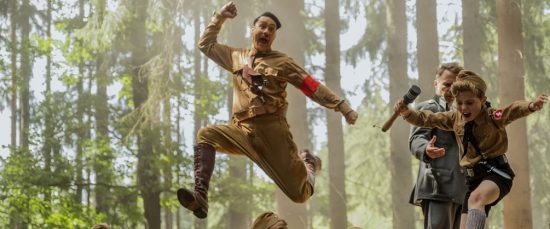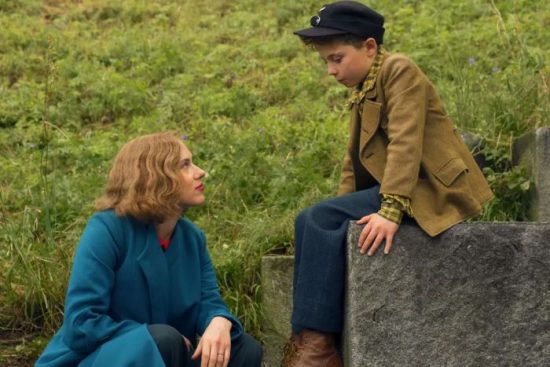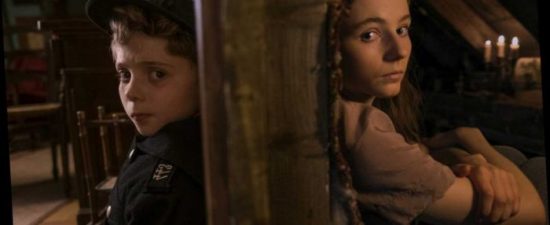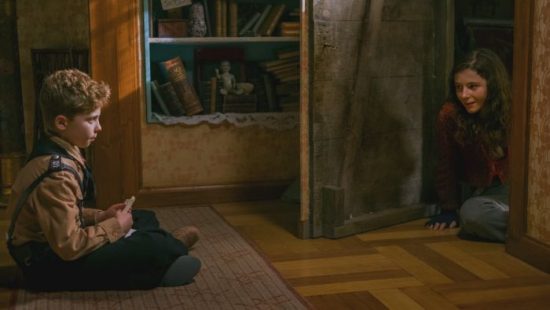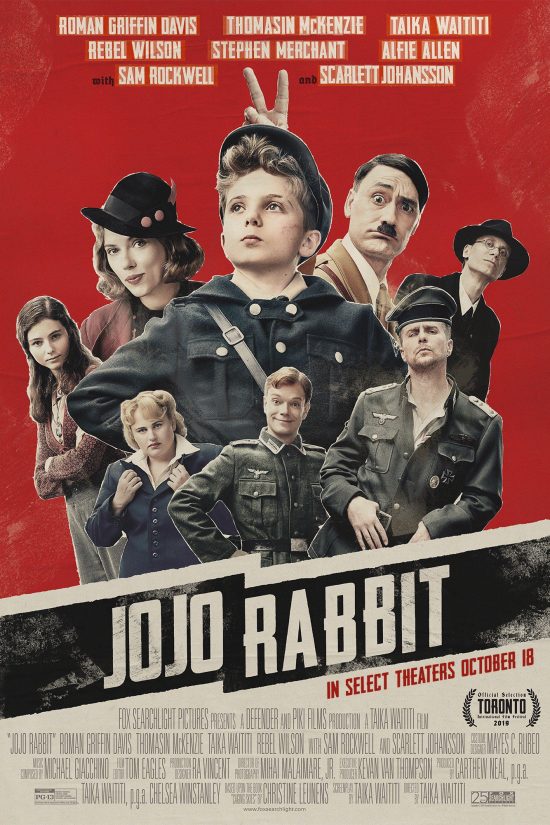Review: Jojo Rabbit – “An unusual beast”
Directed by Taika Waititi
Starring Roman Griffin Davis, Thomasin McKenzie, Taika Waititi, Rebel Wilson, Stephen Merchant, Alfie Allen, Sam Rockwell, Scarlett Johansson, Archie Yates
The latest from one of my favourite creators, the Kiwi director and actor Taika Waititi (What We Do In The Shadows, Hunt for the Wilderpeople, Thor: Ragnarök), Jojo Rabbit, based on Christine Leunens’ book Caging Skies, brings with it some controversy for using humour and fantasy elements to depict the Nazi regimes, from Hitler Youth teams to the Gestapo (a fun turn from Stephen Merchant with just a touch of the old Herr Flick about it) to a cartoonish version of the Fuhrer, and even opening credits that conflate screaming Beatlemania era crowds with those flocking to Hitler rallies. Some seem to think this detracts from the horror of that regime or the historical events it is based on.
After catching a preview screening I have to disagree – first off, it is Taika Waititi, so surely you expect some delightfully skewed (and often dark) humour, even in the face of awful events? Criticising a Waititi movie for those elements is like saying Gene Kelly danced too much in Singing in the Rain. Secondly, I think the humour and fantasy elements were well-used – some for outright comedic effect, but many to counterpoint the barbarity of the Nazi regime, of the brainwashing of children to hate others as different and sub-human, of a state which doesn’t serve its people but consumes them in a hate and fear-filled spiral. Debuting at the 2019 Toronto International Film Festival, these criticisms by some didn’t stop the film doing well and winning the festival’s Grolsch People’s Choice Award.
As you can probably gather from this, I enjoyed the film, but I am an admirer of Waititi’s approach – if his style and humour isn’t your thing then this isn’t for you, but for those who do there is a lot to enjoy here – the humour and the more fantastical elements (not least Hitler – played by Waititi – being Jojo’s childhood imaginary friend) are grounded by the events of the dying days of World War Two, from the indoctrination of children through propaganda, misinformation, lies and the spread of hatred, the ever-present fear of being suspected of not being Germanic enough and getting a call from the Gestapo, of seeing your own country go so insane with a hate-driven regime that it trains eleven-year-old children to use as cannon-fodder.
As we watch young Jojo (Roman Griffin Davis) and his best pal Yorki (Archie Yates, who reminded me – in a good way – of a very young Nick Frost) trying to come to terms with the reality of the Nazi regime as he sees supposed traitors strung up from a gallows in the town square (his mother Rosie, played by Scarlett Johansson, forces him to look at it, to see what the Nazi regime really does) to finding his mother has secretly hidden a young Jewish girl Elsa (Thomasin McKenzie) in their home to save her. Jojo is ten – he has been raised in a Germany controlled by the Nazis, indoctrinated since he was a tiny boy to believe in the Aryan supremacy, of the conspiracy of others (especially Jews), conditioned to think as the state wants him to.
Scarlett Johansson is superb as his life-affirming mother Rosie, clearly loving her son more than anything in the world and yet wondering where did the little boy who ran to her because he was scared of thunder go, when did he turn into this small, blue-eyed, blonde-haired Nazi in a miniature uniform, spouting party propaganda. While you could take much of Jojo Rabbit as an odd, slightly surreal take on the brutalities of that regime, it seemed to me you could also read the film in a number of other ways, from a comment on toxic masculinity (boys being told how to be men mostly through hiding emotions, being “strong”, brutal, pitiless), or the way such propaganda spreads hate through our society, especially to the younger, more impressionable – in Rosie’s anguished musings over how her beloved wee boy became this fervent Nazi I was reminded of an article by a mother in the US whose previously well-behaved, loving teen son absorbed right-wing hate-group material online and changed drastically in much the same way.
Johansson steals many scenes, a mother in the worst of circumstances, trying to salvage her wee boy from the hateful poison put into his young head, to protect a young girl who reminds her of her own lost daughter, of her husband supposedly lost on the Italian front somewhere, of her country gone mad, and yet she does so many happy little things to make life more bearable, to make Jojo smile. It reminded me in some ways of Roberto Benigni in the remarkable Life is Beautiful. The relationship that develops between Jojo and Elsa is also nicely handled – it doesn’t feel too forced and it did feel to me like the way a child would see the world, not an adult trying to speak as a child. The always brilliant Sam Rockwell, playing wounded army captain Klenzendorf may have a supporting role, but it is Rockwell, so it is beautifully underplayed, his damaged soldier moving from caricature of the war-crazy retired warrior to something more human, almost a father figure for Jojo.
Yes, this is an unusual beast, and I do understand when some criticise the cartoonish and humorous elements depicting the Nazis, but I don’t think those do reduce the reality of what happened. As I said at the start I think if anything the humour and fantastical elements contrast against the brutality and make it stand out more. And we do have a long tradition of using film to lampoon Nazis, after all – Bugs Bunny did it for the war effort in the 40s, the great Mel Brooks has lampooned them many times and even the Blues Brothers had their inept Illinois Nazis to ridicule. In an era where it feels like far-right hatred is expanding in so many countries, I think Jojo Rabbit may be portraying a historical period, but there is an awful lot of contemporary issues which we can see woven in there.

